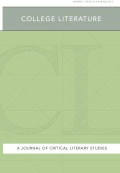
COLLEGE LITERATURE
Scope & Guideline
Challenging Norms in Literary Studies
Introduction
Aims and Scopes
- Transcultural and Postcolonial Studies:
The journal frequently publishes works that examine literature through the lens of transcultural interactions and postcolonial critiques, highlighting how these narratives shape and reflect cultural identities. - Race, Identity, and Social Justice:
A significant focus is on race and identity, particularly in the context of social justice. This includes examinations of racial representations, anti-racist rhetoric, and the influence of historical narratives on contemporary literature. - Literary Theory and Methodology:
The journal engages deeply with literary theory, exploring diverse methodologies such as cognitive poetics, feminist readings, and posthumanist perspectives, encouraging a multifaceted approach to literary analysis. - Global and Interdisciplinary Perspectives:
'College Literature' integrates global perspectives, often addressing literature from various national contexts and its relation to global issues, thus fostering an interdisciplinary dialogue between literature and other fields. - Teaching and Pedagogy:
There is a consistent emphasis on pedagogical approaches to literature, discussing how literary texts can be effectively taught and how they influence cultural understanding in educational settings.
Trending and Emerging
- Digital Literature and Media:
There is a growing interest in the intersections of literature with digital media and technology. Recent papers explore how digital narratives and online platforms reshape literary forms and reader interactions. - Indigenous and Feminist Perspectives:
Emerging themes include a focus on Indigenous literatures and feminist critiques, reflecting broader social movements. These perspectives are increasingly prominent in discussions of representation and narrative agency. - Environmental and Ecocritical Themes:
A notable increase in ecocritical approaches can be observed, with literature being analyzed through the lens of environmental concerns and ecological narratives, highlighting the relationship between literature and ecological awareness. - Transnationalism and Migration:
The exploration of transnational identities and migration narratives is on the rise, addressing the complexities of globalization and cultural exchange in contemporary literature. - Intersectionality in Literary Criticism:
There is a trend towards intersectional analyses that consider how various identities (such as race, gender, class, and sexuality) intersect within literary texts, promoting a more nuanced understanding of literature's role in society.
Declining or Waning
- Traditional Canonical Studies:
There has been a noticeable decrease in articles focused purely on traditional canonical literature without contemporary relevance. The journal appears to be moving away from purely historical analyses towards more current and socially engaged literary discussions. - Conventional Genre Studies:
Studies that strictly adhere to conventional genre classifications, such as classic realism or formalist approaches, have diminished. The journal increasingly prioritizes innovative genre explorations that intersect with contemporary issues. - Historical Literary Contexts:
While historical context remains important, there is less emphasis on purely historical literary analyses without a connection to present-day implications or discussions of current cultural issues.
Similar Journals
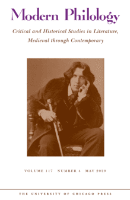
MODERN PHILOLOGY
Illuminating the Rich Tapestry of Modern PhilologyMODERN PHILOLOGY is a distinguished academic journal published by the University of Chicago Press, dedicated to the exploration and advancement of knowledge in the fields of cultural studies, linguistics, and literary theory. Having commenced its publication in 1905, the journal continues to foster scholarly discourse and innovation through rigorous research and critical analysis, making it a vital resource for researchers, professionals, and students alike. With an ISSN of 0026-8232 and a commendable Scopus ranking, including a 69th percentile in Literature and Literary Theory, MODERN PHILOLOGY occupies a significant position within its respective quartiles (Q4) in the 2023 assessments. Although the journal does not currently offer open access, it remains a crucial platform for contributions that interrogate the complexities of language and literature. As a leading publication in its field, MODERN PHILOLOGY invites submissions that challenge conventional paradigms, encouraging a fresh examination of texts, contexts, and cultural phenomena from 1996 through 2024 and beyond.
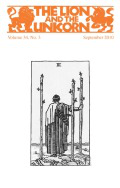
LION AND THE UNICORN
Transforming literary studies through interdisciplinary insights.The Lion and the Unicorn, published by Johns Hopkins University Press, is a premier journal in the field of Literature and Literary Theory, recognized for its critical contributions to the study of children's literature and its interdisciplinary connections. With an impressive Q2 categorization for 2023 and a Scopus rank placing it in the top 71st percentile of its field, this journal showcases innovative research and scholarly discourse that pushes the boundaries of literary criticism. Researchers, educators, and students alike will find a wealth of knowledge in its compelling articles that explore narratives, themes, and the cultural significance of literature. Published biannually, it invites contributions that interrogate the intersections of literature, culture, and pedagogy, fostering a vibrant dialogue among its diverse readership.
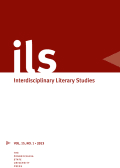
Interdisciplinary Literary Studies
Redefining Literature Through Interdisciplinary LensesInterdisciplinary Literary Studies is a prominent journal published by Penn State University Press that delves into the rich and diverse field of literature and literary theory. Established to foster scholarly dialogues, this journal embraces an interdisciplinary approach, making it a valuable resource for researchers, practitioners, and students interested in the multifaceted dimensions of literature. With an ISSN of 1524-8429 and an E-ISSN of 2161-427X, the journal operates without open access, reflecting its commitment to maintaining rigorous academic standards. The journal is ranked in the Q3 quartile of literature and literary theory for 2023 and holds a Scopus rank of #730 out of 1106, placing it in the 33rd percentile, which further emphasizes its emerging stature within the academic community. Spanning converged years from 2017 to 2024, Interdisciplinary Literary Studies continues to impact the dialogue within the humanities, encouraging nuanced analyses and interdisciplinary connections that push the boundaries of literary scholarship. Set in the United States, the journal is dedicated to exploring contemporary and historical texts, critical theories, and diverse literary forms, making it an essential publication for anyone passionate about the evolving landscape of literature.

ENGLISH LANGUAGE NOTES
Illuminating the Complexities of Language and LiteratureENGLISH LANGUAGE NOTES is a premier journal published by the University of Colorado, dedicated to the field of literature and literary theory. With a strong impact in academia, it holds a prestigious Q2 ranking in the 2023 category, emphasizing its importance among scholarly publications. The journal, indexed under ISSN 0013-8282 and E-ISSN 2573-3575, has been a crucial resource since its inception in 1969, featuring converged years from 1969, 1977, and 1982, through to 2024. The editorial board promotes rigorous scholarship and encourages contributions that explore the complexities of the English language across diverse literary contexts. While it does not offer open access, ENGLISH LANGUAGE NOTES remains a vital source for researchers, professionals, and students invested in the sustained exploration of literary arts, evidenced by its strong Scopus ranking in the 79th percentile in its field. For those committed to advancing literary scholarship, this journal serves as an invaluable platform for discussion and dissemination of influential ideas.

CRITICA LETTERARIA
Exploring the Depths of Literary DiscourseCRITICA LETTERARIA is an esteemed literary journal published by Paolo Loffredo Iniziative Editoriali SRL that has been contributing to discussions in the field of literature and literary theory since its inception in 2009. With an ISSN of 0390-0142 and an E-ISSN of 2035-2638, this journal is indexed in Scopus, ranking in the category of Arts and Humanities under Literature and Literary Theory. It is classified in the Q4 quartile, indicating its dedication to serving a niche yet vital discourse within the broader literary community. Although currently not open access, the journal offers a platform for scholars, researchers, and students to engage with diverse literary analyses and theoretical advancements. Located in the vibrant city of Naples, Italy, CRITICA LETTERARIA aims to foster academic dialogue and promote innovative approaches in literary studies, making it an important resource for anyone passionate about navigating the complexities of literary narratives and theory.
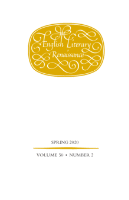
ENGLISH LITERARY RENAISSANCE
Advancing Scholarship in English LiteratureENGLISH LITERARY RENAISSANCE, published by University of Chicago Press, stands as a pivotal academic journal in the realm of Literature and Literary Theory. With a historical pedigree dating back to 1971, this esteemed journal has made significant contributions to the study of English literature, exploring a wide array of themes, methodologies, and critical interpretations that underscore the richness of literary discourse. The journal is ranked in the Q2 category for literature and literary theory and is positioned in the 89th percentile in the Scopus rankings, affirming its impact within the field. Although it does not operate under an open access model, ENGLISH LITERARY RENAISSANCE continues to attract a vibrant community of scholars and educators eager to engage with its rigorous scholarship and innovative approaches. This journal not only serves as a platform for groundbreaking research but also fosters critical dialogue that shapes the future of literary studies.

Novoe Literaturnoe Obozrenie
Fostering Scholarly Discourse in Literary StudiesNovoe Literaturnoe Obozrenie, an esteemed publication dedicated to the realms of Cultural Studies and Literature and Literary Theory, serves as a vital resource for scholars and professionals alike. Published by NOVOE LITERATURNOE OBOZRENIE-NEW LITERARY OBSERVER in the Russian Federation, this journal provides critical insights and scholarly critiques that reflect the evolving landscape of literary discourse. With an established H-index and a focus on fostering academic inquiry, the journal has secured its place amidst contemporary scholarly discussions, indexed in Scopus with rankings that illustrate its commitment to quality despite a current presence in the lower quartiles. Novoe Literaturnoe Obozrenie is a non-open-access journal, encouraging a traditional yet scholarly approach to literary studies and remains an essential read for researchers, students, and professionals that seek to deepen their understanding of literature’s impact on culture and society. Publishing from 2016 until 2024, it continues to bridge theoretical frameworks with practical discourse, making significant contributions to the fields it encompasses.

Interdisciplinary Studies of Literature
Transforming Literary Analysis Through Interdisciplinary ApproachesInterdisciplinary Studies of Literature is a premier academic journal dedicated to advancing the field of literature and literary theory, published by KNOWLEDGE HUB PUBL CO LTD in China. Since its inception in 2017, this journal has consistently offered a vibrant platform for scholarly discourse, hailing from a prestigious Q1 ranking in the Literature and Literary Theory category, reflecting its commitment to high-quality research. With a Scopus rank of #455 out of 1106 in the Arts and Humanities category and a standing in the 58th percentile, this journal embraces diversity in literary studies while fostering interdisciplinary connections to critical theories and practices. Academics, researchers, and students alike will find valuable insights and innovative perspectives within its pages, making it an essential resource for those engaged in literary analysis and theory. Engaging with this journal not only enriches understanding but also promotes the evolution of literary discourse globally.

Kritika Kultura
Cultivating critical thought in the heart of Filipino academia.Kritika Kultura is an esteemed journal published by Ateneo de Manila University, dedicated to advancing the fields of cultural studies, literary criticism, and post-colonial theory. With its ISSN 2094-6937, this journal serves as a vital platform for scholars and practitioners interested in interdisciplinary research that analyzes the complexities of culture and literature within various socio-political contexts in the Philippines and beyond. Although currently not operating under an open-access model, Kritika Kultura is committed to fostering academic dialogue and disseminating significant research findings, making it an essential resource for researchers, professionals, and students alike. By showcasing innovative approaches and scholarly discourse, the journal contributes to the rich tapestry of Filipino and global academic thought, reinforcing its importance in contemporary scholarship.

TWENTIETH CENTURY LITERATURE
Exploring the Depths of 20th Century Literary ThoughtTWENTIETH CENTURY LITERATURE is a renowned journal published by Hofstra University Press, dedicated to the exploration and analysis of literature and literary theory from the twentieth century. With a focus on both established and emerging voices in the field, this journal serves as an essential resource for researchers, professionals, and students who seek to deepen their understanding of significant literary movements and trends. The journal holds an impressive Q2 category ranking in Literature and Literary Theory as of 2023, showcasing its impact and relevance in the academic community. Though not an open access journal, it provides valuable insights and scholarly discussions that contribute to ongoing debates in literature studies. Covering a converged period from 2002 to 2014 and continuing from 2016 to 2024, TWENTIETH CENTURY LITERATURE positions itself as a pivotal platform for thought-provoking literature critique and scholarly inquiry, making it an indispensable addition to any academic library or personal collection.